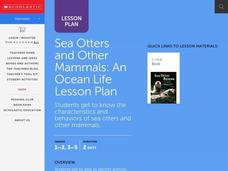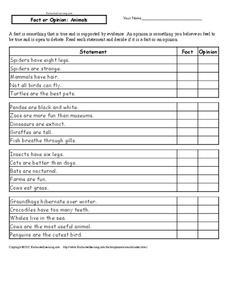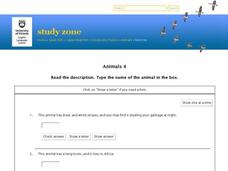Curated OER
She Sells Sea Shells in Illinois??
Second graders sorted shells first by methods they thought appropriate and then were instructed on the scientific method of classification by univalve and bivalve. Students then sorted paper shells as a method of assessing knowledge. It...
American Museum of Natural History
Make Your Own Marine Biology Stationary
Encourage letter writing with marine biology-themed stationary. Three versions showcase a variety of underwater creatures.
Sargent Art
Protect Our Marine Life
Encourage water conservation and boost art skills with a hands-on activity that challenges young painters to create a scene highlighting marine life. Using oil pastels, scholars draw an underwater scene and write a tip for viewers to...
Curated OER
Phylogeny
Here is an unusual collection of slides. The first, which is upside down, is the phylogeny of fish. Next comes an article about invasive lampreys in the Great Lakes area. The third slide shows the life cycle of sea lampreys. A reptilian...
Curated OER
Who Has Denser Fur?
In this mathematics worksheet, learners identify and solve who has the denser fur, either the Sumatran tiger or the sea otter. They calculate the number of hairs for each per inch or per meters and compare them.
Curated OER
Classification of Life
In this classification of life worksheet, students use an on line source to answer questions about how species are classified, named and grouped. They give the classification of a bear, an orchid and a sea cucumber.
Curated OER
Ocean Life
Young scholars identify marine mammals according to specific characteristics. Students read about marine mammals and list their characteristics. Next, young scholars play a Whale and Otter game on the playground to simulate whales...
Curated OER
Dolphin Brains
Students listen to an interview with Lori Marino regarding the development of dolphin brains and read a summarizing text. They conduct further research and participate in class discussion.
American Museum of Natural History
A Whale of a Tale
What's the most interesting fact about a blue whale? Learners read an interview about the similarities between the Titanosaur and the blue whale displays at the American Museum of Natural History. Pupils learn not only about blue whales...
Curated OER
Blue Planet: Seasonal Seas
Students study and research marine invertebrates. In this marine instructional activity students create an illustrated report and help complete a class exhibit.
Curated OER
The Census of Marine Life
Students explain diversity and abundance in marine life. In this oceanic biology lesson, students collect information for various geographical areas to collect a census of marine life.
Curated OER
The Science Behind Dolphins
Students discover facts about marine mammals, specifically dolphins. In this K-2 lesson plan, students identify the different species of Cetaceans, focusing on dolphins. Students answer true/false questions regarding cetaceans and...
Curated OER
Out of the Deep
Learners observe, describe, and record characteristics of ocean animals (mammals and fish) and sea shells. They conduct an experiment comparing and contrasting sugar water, salt water and fresh water and create a mural of coral reef...
Curated OER
Connect the Dots: Polar Bear
For this connect the dots worksheet, pupils connect the dots to an animal that spends most of its life on shifting sea ice and is a marine mammal.
Curated OER
Monitor Marine Migrants
Students, in groups, track the seasonal journey of a species, such as a shorebird, sea turtle, or marine mammal, using various sources of migration data
World Wildlife Fund
Graphs and Charts
A two-part worksheet incorporating bar graphs and pie charts, young mathematicians can practice their graphing skills. Pupils answer questions using graphs and charts but are also challenged to create their own using a given set of data.
Curated OER
Spelling Vocabulary Words with "PH"
In this completing the "ph" words with missing letters worksheet, learners read sentences with incomplete words, use the scrambled missing letters and context clues, and fill in the missing letters to complete the words and sentences....
Discovery Education
Sonar & Echolocation
A well-designed, comprehensive, and attractive slide show supports direct instruction on how sonar and echolocation work. Contained within the slides are links to interactive websites and instructions for using apps on a mobile device to...
Curated OER
Fact or Opinion: Animals
How many legs do spiders have? Is that an opinion, or is it a fact? Complete a worksheet with four sets of five questions about different animals and their attributes, noting whether each statement is a fact or an opinion.
University of Southern California
What Lives In The Ocean?
One of the most diverse environments on Earth is the ocean. Young scientists explore the living things found in the ocean during an exciting seven-lesson unit. Their study includes organisms from plankton to invertebrates and vertebrates...
American Museum of Natural History
What's This? Breathing
Crazy fact: Some animals can survive months without oxygen. An online resource describes some unique ways animals collect oxygen and even live without it for an extended time. Learners read about these special animals and use pop-up...
Curated OER
Manatee Vocabulary
For this manatee worksheet, students explore the characteristics of the manatee. Students match the correct word to each of the ten facts about manatees.
Curated OER
Amos and Boris: Text Study
Twenty insightful questions follow a read aloud of the story, Amos and Boris by William Steig. Scholars then show what they know through completion of a cause and effect chart, reading fluency assessment, and a written explanatory or...
Curated OER
ESL: Animals
In this ESL naming animals instructional activity, students read descriptions of animals and type the correct name of the animal in a box. Students may click on a "show letter" button for help.

























